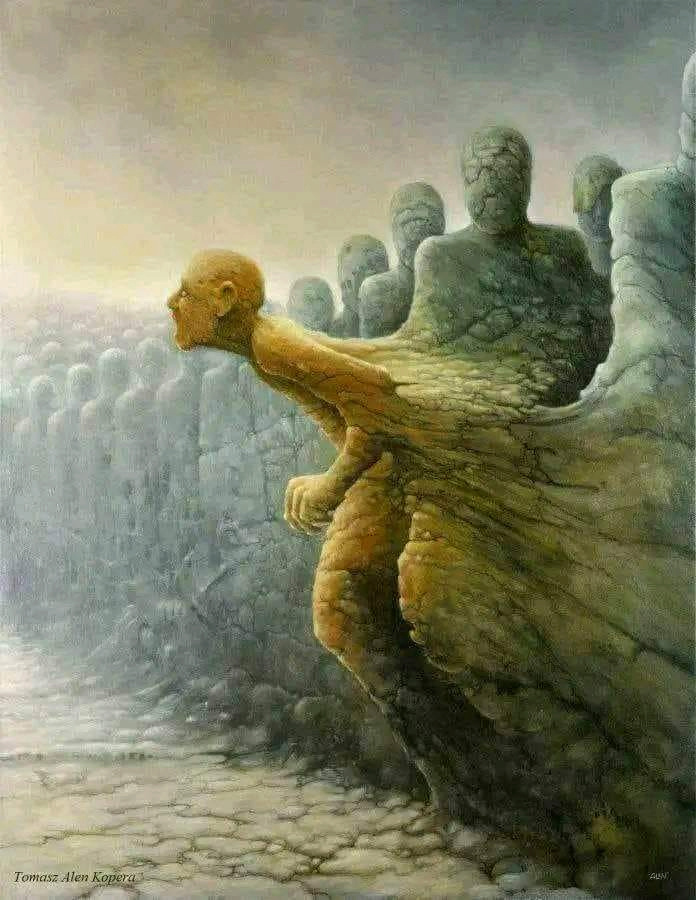One of the most wonderful works of the Polish artist Thomas Kubera is the painting “Straying from the Herd.”

It is a wonderful painting that expresses how difficult it is for an individual to be liberated from the herd culture imposed on him by a society of ignorance and backwardness.
In the picture, a person appears to be trying to become independent and escape from slavery and the control of the herd. The man is screaming in pain and his facial expressions are filled with extreme suffering, but he resists with determination and stubbornness, and his eyes are fixed on something he sees far away, which may be his guiding star and his big dream that he seeks to achieve in order to become a human being. Free and distinct from the herd.
In the picture, an endless number of crowds appear, holding his collar to prevent him from escaping and forcing him to obey their laws. These crowds are united by the same color, the same shape, the same nature, the same characteristics, and the same ideas, as if they were similar templates and one recurring pattern.
No one knows who gave this name to the painting: the critics or the artist himself.
In describing the herd, the French thinker Etienne de la Boisset says in his book “Voluntary Slavery”: The herd lives in an independent world of its own and its interests are limited to: (living - football - sex - religion...)
Religion among the herd has nothing to do with virtue, truth, or justice. Rather, it is merely a fulfillment of form and appearance (beard, jilbab, niqab, speakers, etc.). On the other hand, the herd does not care about morals or behavior. It lies, steals, and takes bribes without embarrassment. He cheats on exams, evades taxes, harasses women, and is not good at his job.
The strange thing is that the flock does not feel guilty or remorseful, except only when it misses one of the prayers!
In the book “The Psychology of Crowds,” the famous French sociologist Gustave Le Pen says:

The convictions of the masses are not formed by persuasion, reason, or logic, but only by emotion. The ideas themselves do not influence the masses, but they are affected by the way these ideas are presented.
Gustave Le Bon continues to describe the masses, saying:
They are emotional and easily submissive, they act unconsciously, their actions are not based on reason and they can be easily deceived, and they have the ability to believe rumors even if they are illogical and irrational. The masses are extremely extreme in their emotions, so they either fully accept the idea without any restrictions or conditions, or they completely reject it. It is absolutely complete, it has no middle, it is very contradictory, and it moves from one opinion to the opposite with the utmost ease.
One day we find her elevating such-and-such player to the highest levels as an example of the struggling young man who honored his country...etc.) And the next day she insults and curses him and brings him down to the lowest level!!
Polish psychologist Solomon S defines the concept of “herd mentality” and says:
“It is the individual performing an illogical act that has no justification, just because everyone around him is doing it.” He says: “The majority has a great influence on the individual and limits his independence. On the other hand, the individual by nature tends to imitate, and has a tendency to submit, blindly obey, and disable the mind.” And not thinking critically.”
The herds sanctify their religious symbols, raise them to the level of worship, and believe everything they say
Even if it contradicts reason and logic.
The behavior of the herd is best represented by a strange incident that occurred in Türkiye in 2005.
Its summary is (that a sheep decided to jump from the top of a mountain thinking that it would survive, and immediately and without hesitation the rest of the sheep, about 1,500 sheep, followed) and they all jumped without thinking and all of them died.
Read, think, learn, use your mind, break your chains, be yourself, and do not be one of the herd.
Source: websites

